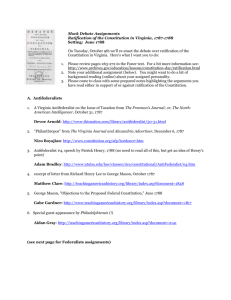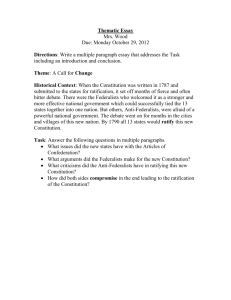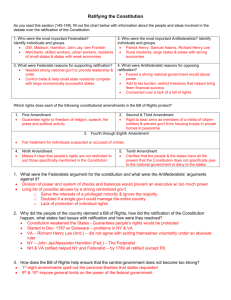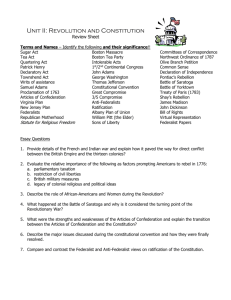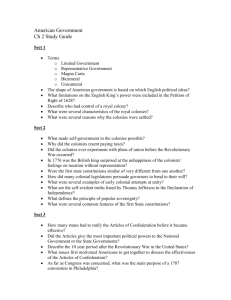Federalist and Antifederalist Arguments During Ratification
advertisement
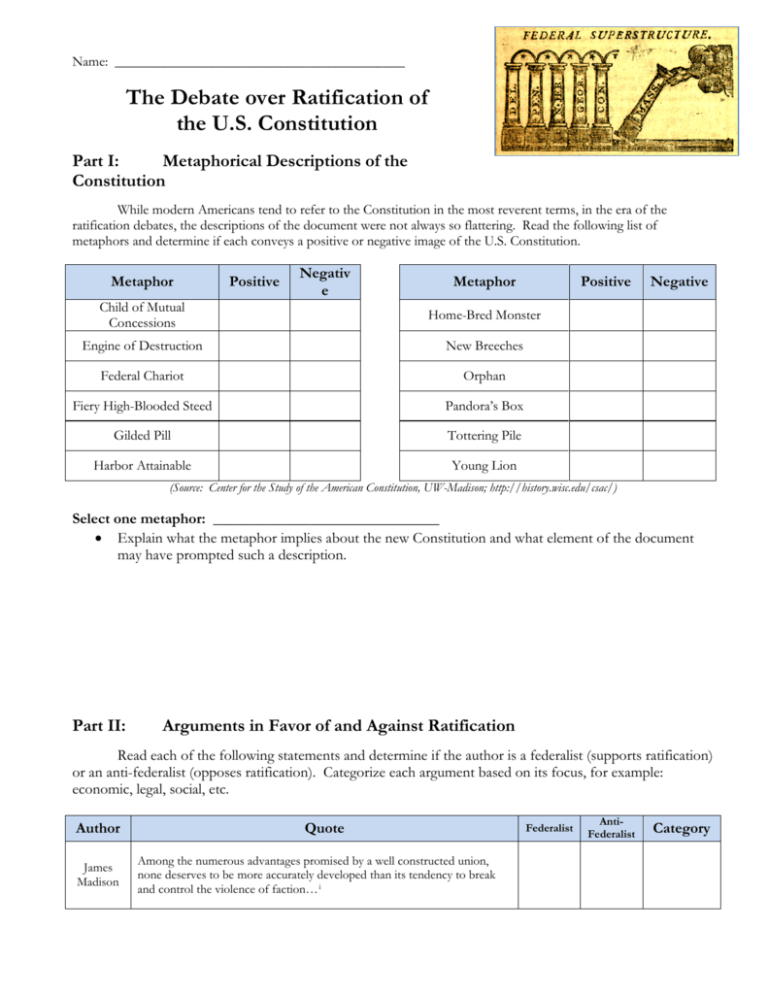
Name: __________________________________________ The Debate over Ratification of the U.S. Constitution Part I: Metaphorical Descriptions of the Constitution While modern Americans tend to refer to the Constitution in the most reverent terms, in the era of the ratification debates, the descriptions of the document were not always so flattering. Read the following list of metaphors and determine if each conveys a positive or negative image of the U.S. Constitution. Metaphor Child of Mutual Concessions Positive Negativ e Metaphor Positive Negative Home-Bred Monster Engine of Destruction New Breeches Federal Chariot Orphan Fiery High-Blooded Steed Pandora’s Box Gilded Pill Tottering Pile Harbor Attainable Young Lion (Source: Center for the Study of the American Constitution, UW-Madison; http://history.wisc.edu/csac/) Select one metaphor: ______________________________ • Explain what the metaphor implies about the new Constitution and what element of the document may have prompted such a description. Part II: Arguments in Favor of and Against Ratification Read each of the following statements and determine if the author is a federalist (supports ratification) or an anti-federalist (opposes ratification). Categorize each argument based on its focus, for example: economic, legal, social, etc. Author James Madison Quote Among the numerous advantages promised by a well constructed union, none deserves to be more accurately developed than its tendency to break and control the violence of faction… i Federalist AntiFederalist Category Nicholas Collin …a fatal disunion would inevitably produce the horrid calamities of civil wars and foreign conquest… the constitution now offered does not assume an inch of unnecessary power, perhaps it is rather too free; if it is not received the people are too bad to be happy – but I am confident that a great majority have sense and goodness enough to accept with joy the only salvation from impending ruin. ii Philadelphiensis I fear they have found you off your guard, and taken you by surprise: these aspiring men have seized the government, and secured all power, as they suppose, to themselves, now openly browbeat you with their insolence, and assume majesty; and even treat you like menial servants… iii George Mason By requiring only a majority to make all commercial and navigation laws, the five Southern States (whose produce and circumstances are totally different from those of the eight Northing and Eastern States) will be ruined… merchants of the Northern and Eastern States not only to demand an exorbitant freight, but to monopolize the purchase of commodities, at their own price… to the great injury of the landed interests, and the impoverishment of the people… iv James Madison The house of representatives will derive its powers from the people of America… So far the Government is national not federal. The Senate on the other hand will derive its powers from the states … and these will be represented on the principle of equality in the Senate… So far the government is federal, not national…. The proposed Constitution therefore, is in strictness neither a national nor a federal constitution; but a composition of both… v Amos Singletary These lawyers, and men of learning, and moneyed men, that talk so finely, and gloss over matters so smoothly, to make us poor illiterate people swallow down the pill, expect to get into Congress themselves… and then they will swallow up all us little folks, like the great Leviathan. vi Patrick Henry Have they said, we the States? Have they made a proposal of a compact between the States? If they had, this would be a confederation: It is otherwise most clearly a consolidated government. The question turns, Sir, on that poor little thing – the expression, We, the people, instead of the States of America. vii Elbridge Gerry …there is no adequate provision for a representation of the people; that they have not security for the right of election; that some of the powers of the legislature are ambiguous, and others indefinite and dangerous; that the executive is blended with, and will have an undue influence over, the legislature; that the judicial department will be oppressive; that treaties of the highest importance may be formed by the President with the advice of two thirds of a quorum of the Senate; and that the system is without the security of a bill of rights… viii • Explain which side you believe presented the stronger arguments. • What was the greatest area of concern to the anti-federalists quoted above? Why do you believe they were most worried about that area of the Constitution? • What was the strongest defense of the federalists quoted above? Why do you believe they focused on that element of the Constitution for their defense? Part III: Ratification by the Numbers Use the ratification map to answer the following questions. • Which state(s) had the strongest support for ratification? • Which state(s) had the strongest opposition to ratification? • What social or geographic differences could account for the variance in attitude toward the Constitution? • Summarize the information on the map noting trends among regions. Use the ratification chart to answer the following questions. State Delaware Dates of Convention Ratification Vote Dec. 3-7, 1787 30 - 0 Pennsylvania Nov. 20 –Dec. 15, 1787 46 - 23 New Jersey Dec. 11-20, 1787 38 – 0 Dec. 25, 1787-Jan. 5, 1788 26 – 0 Georgia Connecticut Jan. 3-9, 1788 128 – 40 Massachusetts Jan. 9-Feb. 7, 1788 187 - 168 Maryland April 21-29, 1788 63 – 11 South Carolina May 12-24, 1788 149 – 73 New Hampshire Feb. 13-22, 1788 (1st Session) June 18-21, 1788 (2nd Session) 57 - 47 Virginia June 2-27, 1788 89 – 79 New York June 17-July 26, 1788 30 - 27 North Carolina July 21-Aug. 4, 1788 (1st Convention) Nov. 16-21, 1789 (2nd Convention) 194 - 77 March 1-6, 1790 (1st Session) May 24-29, 1790 (2nd Session) 34 – 32 Rhode Island • Which state had the closest vote for ratification? Does this correspond to the percentages shown on the map? • Which states had the most one-sided vote for ratification? Does this correspond to the percentages shown on the map? • Which state took the longest amount of time in convention to ratify the Constitution? • Why might three of the states have needed multiple sessions or conventions to achieve ratification? (Source: Center for the Study of the American Constitution, UW-Madison; http://history.wisc.edu/csac/documentary_resources/ratification.htm) i James Madison, Federalist 10; Digital History; http://www.digitalhistory.uh.edu/disp_textbook.cfm?smtID=11&psid=3798 Foreign Spectator (Nicholas Collin), Philadelphia Independent Gazetteer, Oct. 2, 1787; The Documentary History of the Ratification of the Constitution Digital Edition, ed. John P. Kaminski, Gaspare J. Saladino, Richard Leffler, Charles H. Schoenleber and Margaret A. Hogan. Charlottesville: University of Virginia Press, 2009; Canonic URL: http://rotunda.upress.virginia.edu/founders/RNCN-03-13-02-0128 [accessed 27 Jan 2012]; Original Source: Commentaries on the Constitution, Vol XIII: Commentaries on the Constitution, No. 1 iii Philadelphiensis V, Philadelphia Independent Gazetteer, Dec 19, 1787; The Documentary History of the Ratification of the Constitution Digital Edition, ed. John P. Kaminski, Gaspare J. Saladino, Richard Leffler, Charles H. Schoenleber and Margaret A. Hogan. Charlottesville: University of Virginia Press, 2009; Canonic URL: http://rotunda.upress.virginia.edu/founders/RNCN-03-15-02-0006 [accessed 27 Jan 2012]; Original Source: Commentaries on the Constitution, Vol XV: Commentaries on the Constitution, No. 3 iv George Mason, “Objections of the Hon. George Mason, One of the Delegates from Virginia in the Late Constitutional Convention, To the Proposed Federal Constitution; Assigned as His Reasons for Not Signing the Same,” Oct. 1787; TeachingAmericanHistory.org v Publius (James Madison): The Federalist 39, New York Independent Journal, 16 January 1788 vi Amos Singletary, 1788; Digital History; http://www.digitalhistory.uh.edu/disp_textbook.cfm?smtID=11&psid=3798 vii Patrick Henry: Speech in the Virginia Convention, 5 June 1788 viii Elbridge Gerry, Letter to the Massachusetts State Legislature Explaining His Reasons for Not Signing the Constitution, 1787; Digital History, http://www.digitalhistory.uh.edu/disp_textbook.cfm?smtID=11&psid=4519 ii
